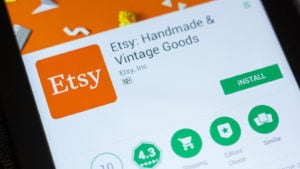If you only have a certain amount of money to invest, don’t be thrown off by high-priced stocks.
Bear in mind, there’s a difference between high-priced and expensive. The former simply means the stock may trade at a three- or four-digit price, rather than a single- or double-digit price. Expensive stocks are those trading at sky-high valuations with little to support them other than momentum.
The goal is to buy the best companies out there right now. And if they trade at a high price, so be it. Our stocks to buy today don’t all come with a big price tag, but they all have great growth prospects now and for many quarters to come.
Here are 7 growth stocks to buy for less than $1,000:
- Salesforce.com (NYSE:CRM)
- Etsy (NASDAQ:ETSY)
- Quidel (NASDAQ:QDEL)
- Simulations Plus (NASDAQ:SLP)
- Stamps.com (NASDAQ:STMP)
- United Microelectronics (NYSE:UMC)
- Goosehead Insurance (NASDAQ:GSHD)
There’s no big difference between buying a few shares of a high-price stock and many shares of a low-price stock. If a $1000 stock goes up 20%, it’s the same as the $50 stock going up 20%, assuming the same size investment. You don’t get “more” by having more shares of a lower priced stock.
Salesforce.com (CRM)

Customer resource management, or CRM, was one of those sectors that didn’t really exist before the dotcom era.
Certainly there were programs that helped enterprise level companies manage their sales data, customer information and progress in landing new prospects. But having all of the diverse aspects of CRM in one integrated software platform gave everyone greater growth visibility and management insight.
That was the magic of Salesforce.com then. Now its platform is cloud-based. Revenue is recurring, since billing is now far more regular than back in the day when software companies only sold new versions.
Salesforce.com has been a pioneer of CRM, hence its ticker. And it continues to be a major player in the industry.
Now that many workers are working from home, need for CRM resources has only grown. The stock is up 77% in the past 12 months, and it’s still on a strong growth track.
Etsy (ETSY)

Certainly Amazon (NASDAQ:AMZN) and eBay (NASDAQ:EBAY) have filled a need for shoppers not interested in heading to the store during this pandemic.
ETSY has thrived as well. While brick and mortar boutiques have suffered in towns and cities across the U.S., ETSY has become the online substitute for those boutiques, selling handmade, unique merchandise.
But the company also takes it one step further. Since it knows that many of its clients are more artists than business people, and they don’t have a marketing department powering their page or approach, ETSY helps these merchants sell on the site.
The more successful their merchants are, the more successful ETSY is. That’s a unique twist to the business model that has benefited buyers and sellers. And ETSY shareholders.
The stock is up 147% in the past year, and growth will continue as competition loses traction and the company holds its new customer base.
Quidel (QDEL)

You’ve likely heard the old saying that those who made the most money during the gold rush weren’t the prospectors, but the store owners that sold them the picks and shovels.
Well in modern times, QDEL is one of those pick-and-shovel companies. It doesn’t make drugs but rather testing equipment. This company has been around since 1979 and is a leader in diagnostic equipment.
You can imagine being a testing company as the pandemic drags on. This is one of the most important aspects of corralling the virus and stopping its spread, especially as infection numbers continue to climb.
It has certainly benefitted from the initial outbreak and the rally in drug stocks. And it’s a smaller, more focused player than its competitors, so growth has been more significant.
Right now, the stock is up a whopping 388% in the past year, yet it’s still trading at 77 times P/E. That’s quite high, but there are many in this sector that are much higher. And there’s plenty of growth left for this sector.
Simulations Plus (SLP)

Another niche pick-and-shovel company, SLP conducts drug research for pharmaceutical and biotech firms.
Nowadays, it costs on average about $2 billion to get a drug through drug trials. That means you want to do everything right from the start to increase your chances of getting it through.
It also means that drug companies have found that making money selling drugs and finding new candidates is what helps drive revenue; trials are best left to someone who is good at that.
There are other firms in this sector, and pre-pandemic SLP was a small cap in the space. It still only has a market cap of $1.2 billion, but this is a niche that has been growing for many years.
This is a new age in drug discovery, so there will be plenty of business for many years to come for SLP. The stock is up 128% in the past year but has real long-term growth potential.
Stamps.com (STMP)

Going to the post office in the digital age was becoming a bit nostalgic. Going in the era of COVID-19 is a trip most will avoid at all costs.
That has been paying off for STMP, which has been selling digital postage for 24 years now.
Initially its client base was commercial businesses that used a lot of postage regularly. Its home division wasn’t that big. But now that workers are in home offices and post offices are one more place to avoid, STMP is becoming the go-to option. And this dynamic isn’t likely to change once the pandemic eases.
The stock is up 257% in the past year, yet it still trades at a decent PE of 50.
United Microelectronics (UMC)
The tech bull continues to charge. And that means computers and mobile devices will remain in demand.
That’s good news for UMC, a Taiwan-based semiconductor foundry. Its not as big as Taiwan Semiconductor (NYSE:TSM), but it’s still a major player. And as tech demand grows, so will the fortunes of UMC.
It has 11 manufacturing facilities worldwide, with factories in Singapore and China, two strategically important places in Asia for future growth. The company has been around since 1980, so it has seen its share of sector booms and busts and knows how to roll with the punches.
The stock is up 165% in the past 12 months, yet still trades at a PE of 47.
Goosehead Insurance (GSHD)

Remember when realtors realized that working for the buyer might be a good idea and started the concept of buyer’s agents? Or when brokerages realized helping their client was better than selling off the brokerage’s inventory?
Well, GSHD is doing the same thing for the insurance industry. Its agents represent clients rather than the insurance company. That means they can offer over 80 different brands of insurance and create a more customized package for their clients.
It’s a model that is gaining some attention. The stock is up 92% in the past year as business grows and its corporate footprint expands. Since 2003, it has built out 1,110 franchise offices.
The combination of a franchise is especially attractive now, as the economy sit in limbo and many workers are looking for alternative employment options. Plus, going after the established players’ customers in the industry is another opportunity for growth.
The stock is 92% in the past year, and while its P/E is high, it’s in a new growth phase right now, so it’s not a significant issue.
On the date of publication, Louis Navellier had long positions in ETSY, QDEL, STMP, UMC and GSHD. Louis Navellier did not have (either directly or indirectly) any other positions in the securities mentioned in this article.
The InvestorPlace Research Staff member primarily responsible for this article did not hold (either directly or indirectly) any positions in the securities mentioned in this article.
